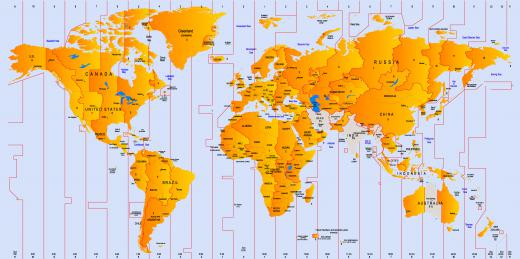China is a vast country, yet it has only one time zone, called Beijing Standard Time (BST), or China Standard Time (CST), which is Greenwich Mean Time, plus 8 hours (GMT+8). Though it used to consist of five time zones, the Communist government changed the country to only one in the late 1940s as part of an effort to streamline it. This has led to some practical concerns for those who live far away from Beijing and, as a result, some areas do not strictly adhere to the standard time. China is the only large country besides India that only uses one time zone.
Purpose

The reason that the country only has one time zone is both practical and political. The Communist party established the country's current time system shortly after it founded the People's Republic of China (PRC) in 1949 to streamline operations, but also to make the country appear more unified. This was a strongly political move, since the country is so large and consists of many regions and ethnic minorities, and it has historically been difficult for one power to effectively rule over all the different areas. It was particularly important to establish authority over the entire country in 1949, as it had been divided by civil war for over 20 years and had gone through a period of fragmentation before that.
Practical Concerns

Having only one official time does cause practical problems, especially for people in the western provinces. Beijing is about 3.5 hours ahead of the far Western provinces, meaning that in some cases, the official time is already 10 AM when the sun rises in places like Xinjiang and Tibet. Since many of the people in those provinces are ethnic minorities, they sometimes feel that the use of BST is oppressive and unnecessary. Additionally, many farming communities throughout the country just use their own times, since agricultural work has to be done when the sun is out, regardless of the official time
Exceptions

Hong Kong and Macau both use their own time, called Hong Kong Time (HKT) and Macau Standard Time (MST), both of which are Coordinated Universal Time, plus 8 hours (UTC+8). Neither region uses daylight savings time. Many areas in Western China, particularly Xinjiang, also work on their own unofficial time zone. Though this sometimes has political implications, it's usually more of a practical move. For instance, stores sometimes work on modified times so that people can conveniently shop in them.
History

Before the establishment of the PRC, China was divided into five time zones. From east to west, they were Changpai Time Zone, Chungyuan Standard Time Zone, Kansu-Szechuan Time Zone, Sinkiang-Tibet Time Zone, and Kunlun Time Zone, ranging from GMT + 8.5 to 5.5 respectively. After the single time zone was introduced, the country did use daylight savings time for a while, from 1986 to 1991, but it was considered inconvenient and dropped.
